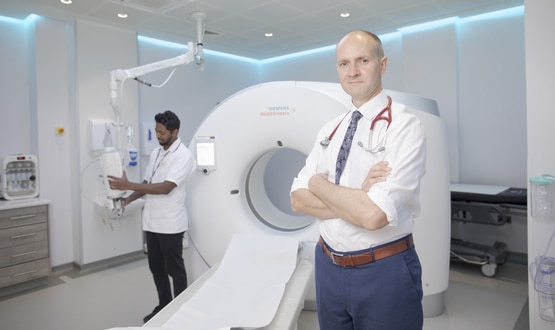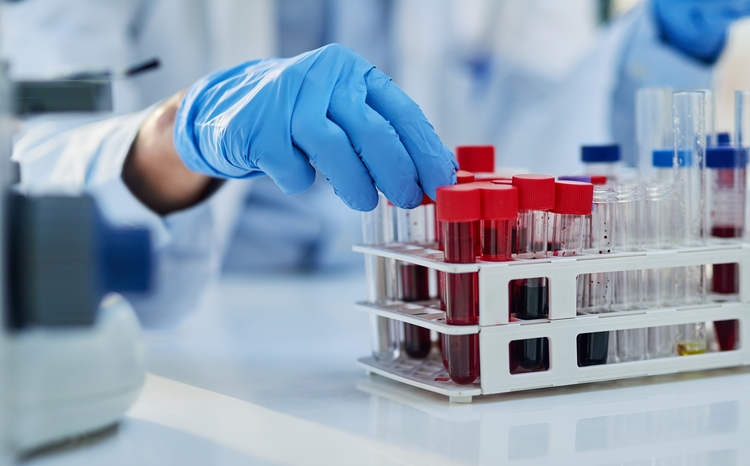AI could help doctors diagnose lung cancer earlier according to study
- 3 May 2023

Artificial intelligence (AI) could help doctors diagnose lung cancer earlier, according to a study led by researchers from The Royal Marsden NHS Foundation Trust in collaboration with The Institute of Cancer Research, London, and Imperial College London.
The LIBRA study – which was supported by The Royal Marsden Cancer Charity, the National Institute for Health and Care Research (NIHR), RM Partners and Cancer Research UK – used data from the CT scans of nearly 500 patients with large lung nodules to develop an AI algorithm. The AI model was then tested to see if it could accurately identify cancerous nodules.
Lung nodules are abnormal growths that are common and mostly benign. However, some lung nodules can be cancerous, and large ones (e.g., 15-30mm in size) are associated with the highest risk.
Researchers hope this technology will eventually be able to speed up the detection of lung cancer by helping to fast-track high-risk patients to treatment, and by streamlining the analysis of patient scans.
The authors used a measure called the AUC (“Area under the curve”) to assess how effective the new model was at predicting cancer. An AUC of 1 indicates a perfect model, while 0.5 would be expected if the model was randomly guessing.
The results, which have been published in the Lancet’s eBioMedicine, indicate that the AI model was able to identify each nodule’s risk of cancer with an AUC of 0.87. The performance improved on the Brock score, a test currently used in clinic, which scored 0.67.
The new model also performed comparably to the Herder score, another test currently used in clinic, which had an AUC of 0.83.
However, as the artificial intelligence model uses only two variables, as opposed to 7 for the Herder score and 9 for the Brock score, it could potentially streamline and speed up nodule risk calculation in the future.
The new model may also help clinicians make decisions about patients who currently don’t have a clear referral pathway. Using Herder, patients are categorised as low risk if they score less than 10%, and high risk and needing intervention if they score over 70%.
For the patients in the intermediate risk group (10-70%), a broad range of tests or treatment options could be considered. When combined with Herder, the researchers’ model was able to identify high-risk patients in this group and would have suggested early invention for 18 out of 22 (82%) of the nodules that went on to be diagnosed as cancerous.
To analyse the CT scan data, the researchers used a technique called radiomics, which can extract information about the patient’s disease from medical images that can’t be easily seen by the human eye.
Need to speed up diagnosis
Lung cancer is the leading worldwide cause of cancer mortality and accounts for just over a fifth (21%) of cancer deaths in the UK.
Patients diagnosed with early-stage disease can be treated much more effectively, but recent data shows over 60% of lung cancers in England are diagnosed at either stage three or four, so initiatives to speed up detection are urgently needed.
Dr Benjamin Hunter, clinical oncology registrar at The Royal Marsden NHS Foundation Trust and clinical research fellow at Imperial College London, who is funded by Cancer Research UK, said: “According to these initial results, our model appears to identify cancerous large lung nodules accurately.
“In the future, we hope it will improve early detection and potentially make cancer treatment more successful by highlighting high-risk patients and fast-tracking them to earlier intervention.
“Next, we plan to test the technology on patients with large lung nodules in clinic to see if it can accurately predict their risk of lung cancer.”
Chief investigator for the LIBRA study is Dr Richard Lee, consultant physician in respiratory medicine and early diagnosis at The Royal Marsden and team leader for the early diagnosis and detection team at The Institute of Cancer Research, London.
He said: “People diagnosed with lung cancer at the earliest stage are much more likely to survive for five years, when compared with those whose cancer is caught late.
“This means it is a priority we find ways to speed up the detection of the disease, and this study – which is the first to develop a radiomics model specifically focused on large lung nodules – could one day support clinicians in identifying high-risk patients.”
Keith Hewett, 64 from Watford, was diagnosed with lung cancer in 2018 and treated with surgery at his local hospital. He was then referred to Dr Richard Lee at The Royal Marsden for follow-up care.
Last year, a CT scan revealed nodules in Keith’s lung, and, after further investigation, he was diagnosed with cancer again.
Keith, whose medical history is similar to patients used in this study, said: “It turned out that there were three nodules in my lungs which were cancerous, and I was treated with surgery at The Royal Brompton.
“Any new technology that helps gives more clarity over whether something on a CT scan is or isn’t cancer would be great. As a patient, you want to know whether you have the disease as soon as possible because the earlier the treatment, the better the outcome.”




